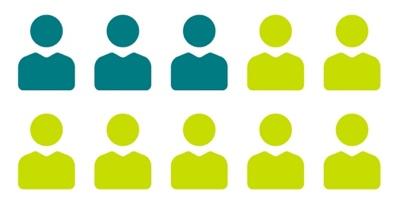
There is no single way to accumulate your retirement nest egg. But you’ll stand in good stead by weighing up the options for your future and pinpointing the amount you’ll need to live your dream retirement lifestyle.
With only 21% of people feeling confident in their retirement planning, according to the Unbiased 2023 Financial Confidence Survey, getting retirement ready is something we need to work on.
But what works for you depends on a combination of factors, and it’s important to establish these as part of your planning.
When should I retire?
Figuring out when you should retire is a great first step.
The full retirement age is 66 if you were born from 1943 to 1954. This increases gradually for those born between 1955 and 1960; for those born in 1960 or later, you’ll only receive full retirement benefits aged 67.
Here is a breakdown of your what your full retirement age will be depending on the year you were born:
The retirement age is not fixed so you have the flexibility to retire at any time. If you retire at 62, you’ll be eligible to receive a reduced Social Security payment. Those who retire at 65 and over will receive some free Medicare benefits. To qualify for these benefits, you must have paid contributory taxes for at least 10 years.
Of course, not everyone retires at the same age.
However, with longevity being one of the biggest retirement risks, you need to ensure your savings will go the distance. Outliving your savings is a huge worry for retirees.
If you retire at the age of 65 and live to 100, you’ll require income for 35 years. No one knows how long they will live, meaning planning how you will spend and save during retirement can be difficult.
Generally the longer you’ve worked, the easier it is to retire. The more you work and save for retirement, the more resources you are likely to have available when you retire.
Life is full of big financial decisions, and retirement is one of them, so it makes sense to get as much help as you can along the way.
UNBIASED FOUNDER AND CEO KAREN BARRETT
Doing the math

According to the Unbiased Retirement Confidence Survey, just 32% of those aged between 50 and 66 know what they need to contribute for retirement. For the rest of us, it can feel like a guessing game.
No easy equation demonstrates how much you should save for your retirement.
Experts are tentative about offering a definitive number thanks to the various external factors that can affect your income.
How much you'll need to budget will depend greatly on your unique lifestyle. For example, if you plan to travel the world in retirement and eat out regularly, you will need more money than someone who enjoys cooking at home and exploring their local area.
While there is no one-size-fits-all solution, various recommendations provide a basis from which you can work.
Here are some common rules of thumb you can follow:
- Accrue a retirement pot 10 to 12 times your current income.
- Save a minimum of 10% annually.
- Save at least 15% of your pre-tax salary for retirement.
- Save 25% of your yearly gross salary, starting in your twenties.
Needless to say, not everyone can start saving for retirement in their twenties or thirties. However, if you start later or save less, you may have to work longer or at least cut down on expenses and contribute more to your retirement fund.
It’s also worth noting that money withdrawn from a traditional IRA or 401(k) during retirement will be considered taxable income, but money from a Roth IRA or Roth 401(k), is not usually taxable.
However, the one rule everyone should follow is to start early.
The earlier you start putting money away for your future, the more time it has to grow, allowing you to benefit from the power of compound growth. So, anything you save today, however big or small, can make a sizable difference down the line.
What expenses will you be facing?
Before deciding what sort of retirement lifestyle you’d like, let’s not forget about the necessary expenses you’ll still face even when you stop working.
As you get older, your spending patterns may change; though spending less on transport, you may spend more on your health.
Based on data from the Employee Benefit Research Institute, the chart below offers an idea of how retirees’ spending patterns change over time. (2)
Common retirement planning mistakes to avoid
Retirement planning is a lot about what you should do, but what about what you shouldn’t do?
As you get closer to retiring, financial mishaps can be costly. Making the wrong financial move could be the difference between living out your dream beachside retirement and spending more years in the workforce.
What mistakes should you avoid?
Take poor tax planning, for example.
This can have a detrimental impact on your retirement income. If the bulk of your savings are in plans that require required mandatory distributions (RMDs) or you believe you will be in a higher tax bracket come retirement, it might make sense to convert some of your money into a Roth IRA. By doing this, you will pay taxes on the amount now and none when you eventually withdraw the money. You can also do this yearly, boosting your retirement income as you get closer to this next chapter.
Implementing a solid financial plan for both before and during retirement is the best place to start. Consider when and where you plan to retire, your general health and the lifestyle you want to lead. This will help you work out how much you need to set aside so you can start figuring out how to get there.
Unbiased founder and CEO Karen Barrett says, “The retirement savings landscape can be overwhelming, but financial advisors are here to help. At Unbiased, we’re on a mission to educate people about the importance of engaging a credentialed financial advisor to help make confident financial decisions. Life is full of big financial decisions, and retirement is one of them, so it makes sense to get as much help as you can along the way.”
Plan your retirement with confidence
With rising costs making life more difficult for many, seeking expert help to make your biggest financial decisions has never been more important, especially when making such a huge personal and financial transition. It’s during these challenging times that financial advice often proves most valuable.
Unbiased’s personal finance platform empowers you to make confident, competent financial decisions when it comes to your retirement – regardless of where you are in the process. A leading financial information resource for consumers, it provides a free, comprehensive library of information covering various financial topics to help people to make financial decisions. You can also get paired with an independent SEC-regulated financial advisor who can work with you to start planning your financial future.







